325 conflict affected families in Bama receive permanent shelters from MAIDA
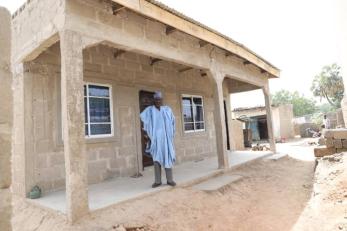
325 conflict-affected families in Bama Local Government Area of Borno State have received permanent shelters from international humanitarian organization Mercy Corps, under the European Union- funded Borno ‘Maida’ – Early Recovery Program.
Mercy Corps Nigeria provided the vital support to beneficiaries who have lost their homes as a result of the insurgency in Northeast Nigeria.
About the shelter intervention
Implemented in Borno State by Mercy Corps and the International Centre for Energy, Environment and Development (ICEED), the program seeks to offer social protection to the families who have returned to rebuild their lives and their communities, as part of the program’s overall resilience building objective.
Mercy Corps Nigeria had learned about the precarious existence of the beneficiaries and their urgent need for shelter following the devastating impact of the insurgency in Bama in 2018. Subsequently, the organization conducted a needs assessment to ascertain how many displaced families were affected and who were most at risk. Findings from the assessment showed that many houses and community structures were damaged while some were completely destroyed.
Working closely with Community Resilience Groups (CRG), the community members were engaged and a suitable shelter prototype for their homes was agreed upon – two rooms and a veranda for 325 of the most vulnerable returnee households.
“To spur on economic recovery for the community, construction work for the shelters were done with support from local artisans and with both materials and labour sourced locally, through a cash-based model. This way we ensure that skilled workers in Bama were able to earn money from participating in the recovery and rebuilding of their community,” said the Maida Program Director, Mercy Corps Nigeria, Thiri Lwin.
Ndubisi Anyanwu, Country Director for Mercy Corps paid tribute to the people of Bama and community leaders for their contribution to the success of the project. He also explained the significance of the project to Bama which has been severely impacted by the insurgency:
“Bama has proven to be one of the communities that have been resilient in their recovery from the security crisis in Borno State. We hold in high regard, the will and dedication with which the community and its leaders have shown in ensuring that their community and homes are restored. It is such determination that drives the commitment behind our shelter intervention – to ensure that vulnerable communities continue to receive urgent, lifesaving assistance as we support recovery beyond emergency response and survival to a more sustainable approach through resilience. Sincere appreciation to the community leaders, government officials and community groups who have been at the forefront, and supporting the process at every stage,” he said.
Anyanwu also commended the Borno State Government through the Ministry of Reconstruction, Rehabilitation and Resettlement (MRRR) who were at the forefront of the intervention, from supporting the community to identifying the best approaches for delivering their shelter needs, to steering the land ownership process.
He also expressed Mercy Corps appreciation for the partnership with the International Centre for Energy, Environment and Development (ICEED) which provided solar home systems and electrical wiring/installations for the shelters.
Commending the support from Mercy Corps and the EU at the hand over ceremony, Borno state Governor, represented by MRRR Permanent Secretary, Engineer Abba Yusuf noted how critical the permanent shelters are for the most vulnerable returnees, IDPs and host community members in Bama.
In a statement by the EU Delegate to Nigeria and Ecowas, Mrs. Cécile Tassin-Pelze, she implored Borno state government to sustain the gains of the project, as the project expires in few months. “It is our utmost desire to see peace and stability restored to the various communities and local government areas (LGAs) experiencing unrest in the state. We will be glad to see families return to their ancestral homes, where they feel happy and have a home of their home to retire in the midst of all the challenges they encounter,” Mrs. Cécile added, while commending the governor for ongoing security intervention in the state.
Participants share their heartfelt appreciation
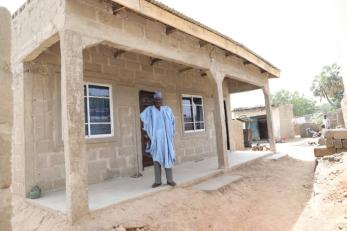
Mustapha Ajimi, 75 years old, is disabled and fends for a household of 14. He lost his family home to Armed Opposition Groups (AOGs) which displaced him and his family from their community after a major attack in Bama. They fled, having to spend three days trekking before arriving at Maiduguri, where they took refuge in an IDP camp. He returned to Bama, to find his house completely damaged, and they had to build a temporary shelter, using leather as roofing for him and his family to stay in.
“Whenever it rains, we would run to neighboring houses because our shelter was dilapidated. But now, I have my own shelter to live happily with my family without any fear of the rainfall or bad weather. May Almighty Allah bless Mercy Corps for this lifesaving assistance,” said Mustapha.
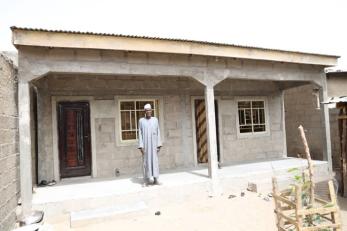
69-year- old Ahmadu Bundi, also lost his home in Bama to insurgency attack. As AOGs attacked Bama town, killing many individuals and destroying thousands of houses, Ahmadu managed to flee to Maiduguri with his family. When government forces retook the town from AOGs, Ahmadu returned to Bama to find out that his house was completely damaged. Ahmadu managed to construct a makeshift shelter to stay with some of his family, while sending others to squat in neighboring houses, in constant fear of forced eviction. His family was one of the most at need, when residents were being selected to receive permanent shelters. Now, Ahmadu currently lives in a two bedroom flat constructed by Mercy Corps for him and his family.
In his words, “Words can't express how happy I am today. My fear of forceful eviction is gone forever. Thank you very much Mercy Corps. I can now live happily with my family in my newly constructed shelter.”
Falmata Bukar used to live in a small dilapidated hut with her family before she received the permanent shelter from Maida. She expressed her heartfelt appreciation, singing words of happiness, “Thank you Mercy Corps, thank you Mercy Corps,” in Hausa, joined in by well-wishers in her community as she shows appreciation for her new home.
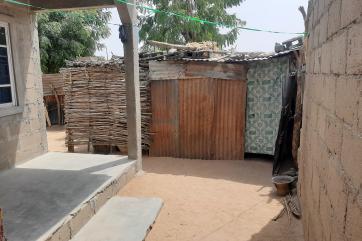
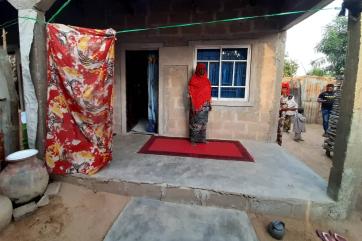
About the EU MAIDA program
Mercy Corps Nigeria, with funding by the European Union, is implementing the Maida program to support the early recovery of about 200,000 returnees, internally displaced persons and members of host communities affected by the violent insurgency in Borno State. Implemented in partnership with the International Centre for Energy, Environment and Development (ICEED), the program is implemented in accordance with the EU’s objective to build the resilience of conflict-affected people and communities in Borno in an environment-friendly way.
Maida also works with youth and adolescents to create opportunities for employment, giving them vocational training and helping them to diversify their income. The program also improves rural livelihoods through the provision of grants/input vouchers, establishing Village Saving Loans Associations (VSLAs), mobilizing and rehabilitating agriculture and livestock cooperatives and linking them to financial services. Maida also works to increase access to protection services for vulnerable populations and building social cohesion for conflict-affected communities. The program supports vulnerable households by disbursing cash transfers, providing energy efficient shelter, and promoting nutritional and hygiene knowledge. In partnership with ICEED, we provide fuel-efficient wood stoves which reduces time spent seeking firewood by women and girls.